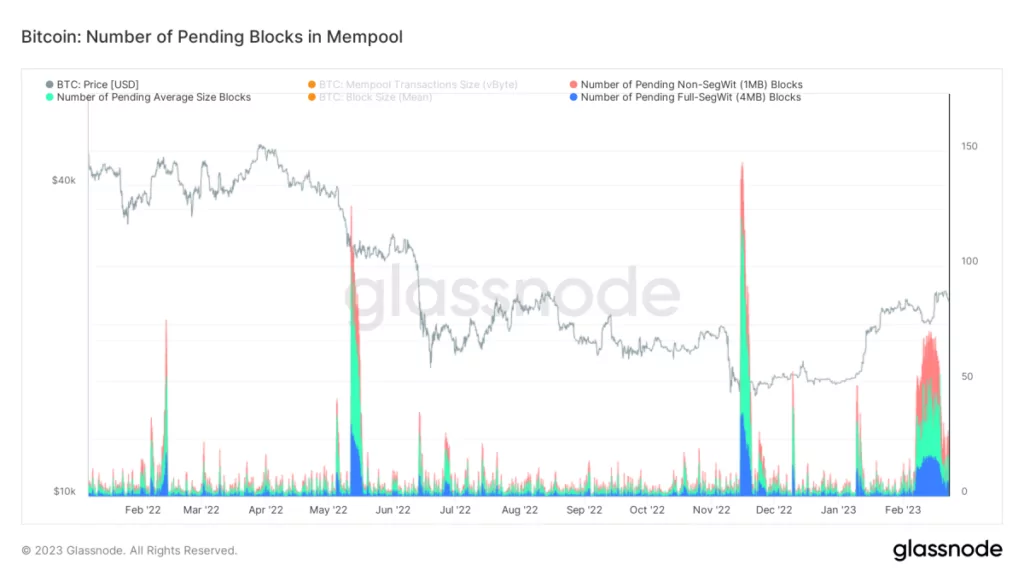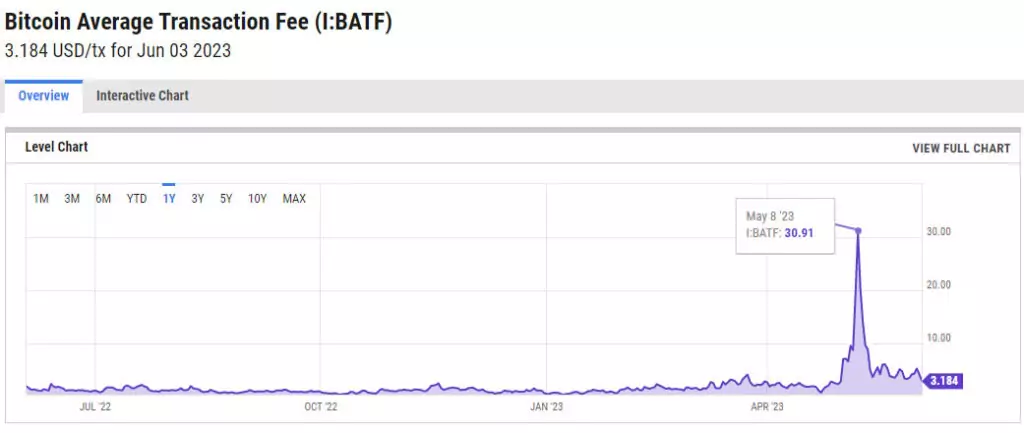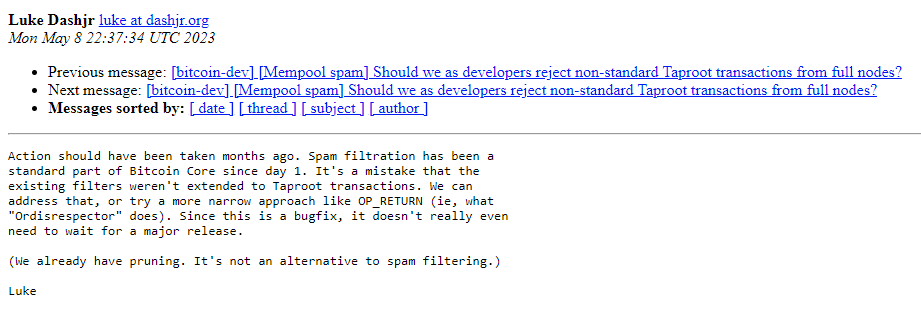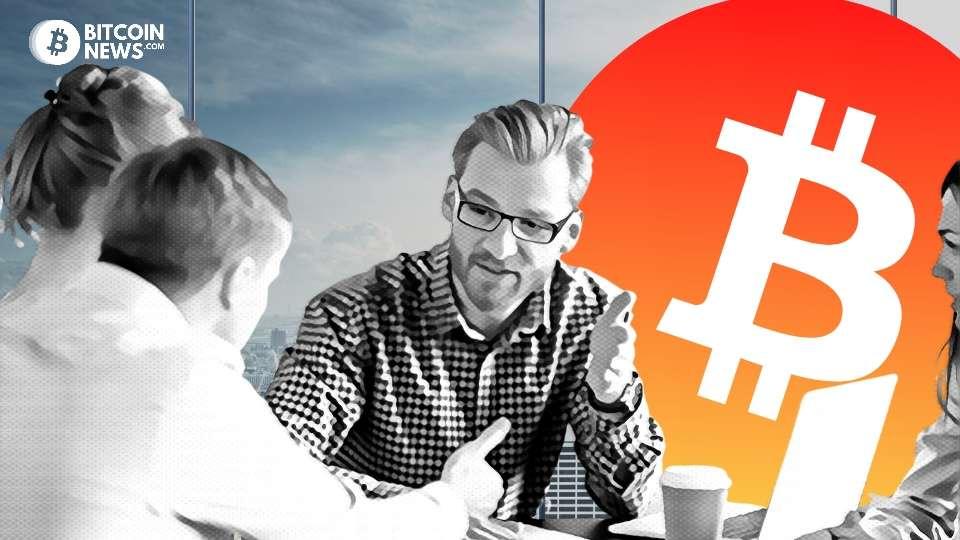A heated debate has emerged among bitcoin developers community regarding the Ordinals protocol and BRC-20 tokens.
Following the announcement of the BRC-20 tokens on Ordinals protocol, the number of inscriptions has skyrocketed and created a backlog of unconfirmed transactions in the bitcoin mempool.

Source : Glassnode.com
This has caused the average required fee for transaction confirmation to increase to a high of $30 on May 8, 2023.

Source : ycharts.com
Is The Bitcoin Network Under Attack?
[wpcc-iframe class=”wp-embedded-content” sandbox=”allow-scripts” security=”restricted” style=”position: absolute; clip: rect(1px, 1px, 1px, 1px);” title=”“Is The Bitcoin Network Under Attack?” — Bitcoin News” src=”https://bitcoinnews.com/bitcoin-network-under-attack/embed/#?secret=ovD6XmmJoj%23?secret=mYkJHqAG56″ data-secret=”mYkJHqAG56″ width=”600″ height=”338″ frameborder=”0″ marginwidth=”0″ marginheight=”0″ scrolling=”no”]
While the turmoil has somewhat subsided, concerns remain among bitcoin maximalists about the potential disruption caused by Ordinals tokens.
These individuals argue that implementing software to block such transactions — essentially acting as a spam filter — is necessary to preserve bitcoin’s functionality as both a means of payment and a store of value.
On the other hand, some experts advocate for the complete removal of BRC-20, raising the question of whether bitcoin should censor or ban these use cases within its network.
Ali Sherief, a bitcoin developer, sparked a heated debate in early May regarding the situation:
I am now convinced that the #brc20 spam on #bitcoin’s blockchain is DDoS attack to bottleneck the network if not grind normal transaction activity down to a halt.
— Ali Sherief #Avenger (@Zenul_Abidin) May 6, 2023
In a series of tweets and emails, Sherief raised concerns about the potential threats facing the bitcoin network.
In an email to the bitcoin-dev mailing list, he wrote:

Hi guys,
I think everyone on this list knows what has happened to the Bitcoin mempool during the past 96 hours. Due to side projects such as BRC-20 having such a high volume, real bitcoin transactions are being priced out and that is what is causing the massive congestion that has arguable not been seen since December 2017. I do not count the March 2021 congestion because that was only with 1-5sat/vbyte.
Such justifiably worthless (“worthless” is not even my word – that’s how its creator described them[1]) tokens threaten the smooth and normal use of the Bitcoin network as a peer-to-pear digital currency, as it was intended to be used as.
If the volume does not die down over the next few weeks, should we take an action? The bitcoin network is a triumvirate of developers, miners, and users. Considering that miners are largely the entities at fault for allowing the system to be abused like this, the harmony of Bitcoin transactions is being disrupted right now. Although this community has a strong history of not putting its fingers into pies unless absolutely necessary – an example being during the block size wars and Segwit – should similar action be taken now, in the form of i) BIPs and/or ii) commits into the Bitcoin Core codebase, to curtail the loophole in BIP 342 (which defines the validation rules for Taproot scripts) which has allowed these unintended consequences?
An alternative would be to enforce this “censorship” at the node level and introduce a run-time option to instantly prune all non-standard Taproot transactions. This will be easier to implement, but won’t hit the road until minimum next release.
I know that some people will have their criticisms about this, absolutists/libertarians/maximum-freedom advocates, which is fine, but we need to find a solution for this that fits everyone’s common ground. We indirectly allowed this to happen, which previously wasn’t possible before. So we also have a responsibility to do something to ensure that this kind of congestion can never happen again using Taproot.
–Ali
Sherief claimed that the network was under a Distributed Denial of Service (DDoS) attack, causing a bottleneck in its operations — the mode of attack being the BRC-20 tokens. According to him, the emergence of this “useless” class of assets rendered the BTC network practically unusable.
Sherief called upon bitcoin developers to contemplate potential solutions to this pressing issue, as he believed that these “worthless tokens” posed a significant risk to the smooth and normal functioning of bitcoin as a peer-to-peer digital currency.
Real people who want to use #bitcoin now can’t make transactions easily because of useless bullshit clogging the network that is #brc20 thatisn’t even an NFT.
Someone connect me with some Bitcoin developers so we can discuss some possible solution to this.
— Ali Sherief #Avenger (@Zenul_Abidin) May 6, 2023
In his argument, Sherief emphasized that the proliferation of “worthless tokens” is causing a detrimental impact on the regular use of bitcoin, leading to an increase in transaction costs and hindering genuine BTC transactions. In one of his recommendations, he urged developers to halt the creation of new tokens through BIP improvements.
Notably, these concerns have prompted other developers, such as Luke Dashjr, to explore potential solutions, including the implementation of spam filtration mechanisms within the BTC network.
He stated that spam filtration has been a part of bitcoin “since day one” and is not a new feature, although it had been neglected during the Taproot upgrade.

Another bitcoin developer, Erik Aronesty, also weighed into the conversation, stating in an email:
the more i think about it, the more that this is essential. consider that bitcoin is secured by mining and mining is secured by fees. all of that is relative to the value of bitcoin itself. but consider the incentive for a reorg if a single ordinal is worth 1 billion dollars and is being transferred. now all the incentive logic is thrown to the wind. non-monetary use is quite dangerous to network stability, and the game theory underpinning it, imo.
But many are against such measures, including Jameson Lopp, co-founder and CTO of bitcoin security provider Casa.
Lopp stated that the bitcoin network functions as an “auction market for the block space.” In other words, the limited space available in each block is valuable and can be bid on by users who want their transactions included in the blockchain. This auction system determines which transactions get prioritized based on the fees offered by users.
He suggested that Ordinals inscriptions, by their nature, generate demand for block space within the bitcoin network. In other words, users competing to use block space for them increase the overall demand for transaction inclusion.
Lopp disagrees with viewing Ordinals and BRC-20 tokens as a denial-of-service attack on the bitcoin network. He believes denial-of-service attacks typically aim to disrupt or overwhelm a system’s resources, and considering Ordinals as a denial-of-service attack is like labeling any auction system as such.
In an auction, only the winners obtain the auctioned item, while the losers do not, but it doesn’t necessarily mean the losers are being denied service.
Michael Folkson, another developer, stated in an email that the bitcoin network should refrain from implementing any alterations aimed at censoring technologies.
He believes that the market itself should address the challenges posed by BRC-20 and Ordinals. Folkson emphasized that while individuals may hold differing opinions on various use cases of bitcoin, the consensus rules are established, leaving the rest to market forces to determine.
Furthermore, he argued against censoring certain features simply because a particular use case may be deemed unfavorable, cautioning that such actions could inadvertently hinder the functionality of other beneficial use cases as well.
While the weight of Ordinals transactions on the mempool has somewhat subsided, the debate continues. Whether any special measures will be considered or not, remains to be seen.



